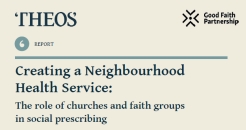 Churches and Social Prescribing
Churches and Social Prescribing
From a report by Theos
Currently, one in five GP appointments are for non-medical reasons. It is also acknowledged that health outcomes are driven by socio-economic factors, including education, income and social support, yet the social factors underlying some clinical needs have not been prioritised and there has been underinvestment in community based healthcare. Today, there is a desire to shift from healthcare as a model of treatment to a model of prevention.
Social prescribing – connecting people to community-based activities to benefit their wellbeing – can be part of that preventative solution. Social prescribing plays a vital role in providing practical support for people who are struggling with loneliness, mental health conditions or financial issues such as debt or unemployment, etc.
Along with other community groups, faith groups not only contribute significantly to local social prescribing networks, but with their focus on community, relationship and holistic wellbeing, they can play a foundational role in preventative healthcare through supporting individuals to access the right support early on.
A large number of friendly, welcoming and “referrable” activities are hosted by faith groups already – predominantly by Christian churches and charities – across the country. This highlights the multiple assets that churches and Christian groups along with other faith groups bring to social prescribing:
-
Being anchors of the community.
-
Having the ability to network and convene within the community.
-
Providing resources through buildings and volunteers.
-
Offering pastoral and spiritual care.
However, there are a number of challenges preventing a better integrative approach between faith groups and social prescribers. There are communication challenges because faith and health communities use different language to talk about very similar things. It is challenging for faith groups to connect and maintain relationships with the ever-changing social prescribing system. Similarly, link workers and local health practitioners don’t know where to go to connect with local faith groups. Furthermore, there are administrative challenges that slow processes down and a lack of funding to keep activities running.
Participants in the Theos study highlight the vital importance of relationships. Trusted personal relationships make a big difference in connecting groups with social prescribing. Across the board, health professionals and faith groups alike were positive about the suitability of faith group activities for social prescribing, with consensus at all levels of the health system that better relationships between the two will help to support more of the people in greatest need.
Despite some of these challenges, health professionals and faith communities appear to be collaborating on social prescribing at a high strategic level as well as at a grassroots level, albeit sporadically throughout the country. This shows that at a both macro and micro level there is consensus that faith groups bring positive results to social prescribing. There is also evidence to show that Social Prescribing Link Workers (SPLWs) are aware of referrable activities and services offered by faith groups. However, this report also found that collaboration is weakest at the middle strategic level, with engagement of faith groups not being strategically pushed from the top to filter down.
At a neighbourhood level: Faith groups should promote activities and services to SPLWs and GP surgeries, convene forums connecting faith and health and increase social prescribing literacy and engagement amongst their communities. Social Prescribing Team Leads and SPLWs should actively engage local faith communities, participate in their activities, go with their patients to faith-based services and seek out additional funding for such activities.
At a places level: Roundtables should be convened between leaders of faith groups, regional church leaders, leaders of charities and PCN clinical directors/Integrated Care Board leads. Faith groups should designate a health and wellbeing lead advocating for social prescribing. Healthcare professionals should draw on the faith communities they have partnered with on other health initiatives such as the Covid vaccine rollout, encourage preventative strategies in the community including placing SPLWs in churches and employ GP chaplains.
At a systems level: NHS leaders, DHSC, NASP and leaders within faith communities should collaborate through existing avenues. Preventative initiatives into the community should be encouraged, including integrating Warm Welcome into social prescribing plans. A ‘Faith Lead’ should be created in public service agencies to convene national work and new funding for faith-based activities should be unlocked.
There is a desire to turn the NHS into a “neighbourhood health service”. In order to actualise this vision, the contribution of faith groups must be fully recognised, and relationship-building – within neighbourhoods, places and systems – between faith communities, the NHS and wider healthcare networks must be established.
Read the full report here.
Find a toolkit for churches and a video about social prescribing here.
Retweet about this article:
From a report by Theos, 13/05/2025